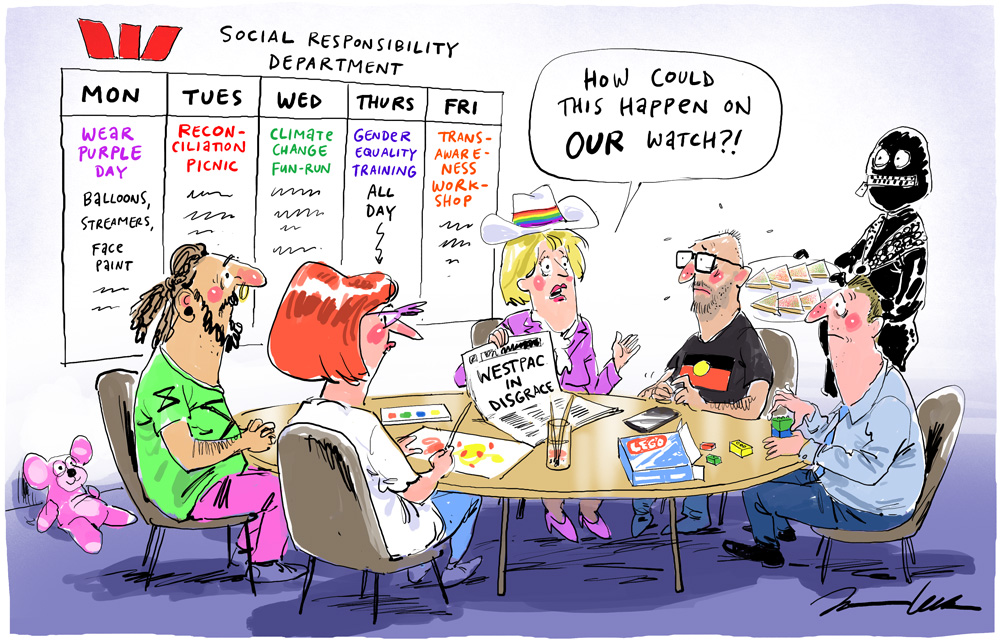
I arrived in Australia to discuss and research corporate social responsibility (CSR) with colleagues at RMIT University and the University of Melbourne to see the papers covered in … a banking scandal.
The Westpac Bank product ‘Litepay’, designed to enable customers to transfer small amounts of money overseas, is alleged to have enabled money-laundering on 23 million occasions. It is alleged that 12 customers used this service to transfer $500,000 to child exploitation criminals in the Philippines.
There is the usual background that senior management was aware of the failures but did nothing. There is the usual foreground that the bank’s leadership made light of the problems, and was strangely slow to accept responsibility. So far so depressingly familiar.

I also noticed Johannes Leak’s cartoon published in The Australian newspaper (27.XI.2019). OK, it is a caricature with the CSR consisting of activities that seem trivial and causes that, notwithstanding their social significance, are adjacent to the legality and ethics of Westpac’s main business!
But caricature is part of the cartoonist’s craft and it highlights the main message: The way that Westpac went about its business appeared untouched by the department ostensibly standing for its social responsibility.
So what lies behind this contradiction?
CSR professionals may well be educated, trained and experienced in other society-related issues. But as the cartoon suggests they were unable to address some key social impacts of the bank’s business models. This may be no accident. It may well suit corporate leadership to have a CSR department to focus on ‘the worthy causes’ and to distract from the business of money-making. So whilst the CSR staff engage in legitimation activities, the main CSR message (i.e. to serve societal good) is disconnected from conducting the core business.
So we need to construe CSR as something more pervasive and robust such that it addresses the core business in all its complexity and technicality. This may mean corporations re-thinking how their products are evaluated, who is around the table at strategy meetings, who leaders listen to, who they collaborate with, what sort of qualifications and capabilities are expected of senior managers and board members.
One positive
One positive in the Westpac story is that the triggers of social sanction operated. Whistleblowers within Westpac (who advised the media), governmental leaders (who expressed grave disquiet and suspended Westpac from a public policy initiative), and major investors (who threatened exit), brought immense pressure on Westpac’s leadership for more proportionate responses.
This is a belated success for the main message of CSR: that business needs to be responsible, and that failure here will be very costly.
Sadly, it comes at a price that investors and customers may have to share. The bank needs to ensure that it has sufficient and appropriate CSR capacity to build the message into the practices of business as usual.

Jeremy Moon – Director of CBS Sustainability, professor of Sustainability Governance at Copenhagen Business School and BOS blog editor. Jeremy has written widely about the rise, context, dynamics and impact of CSR. He is particularly interested in corporations’ political roles and in the regulation of CSR and corporate sustainability.



